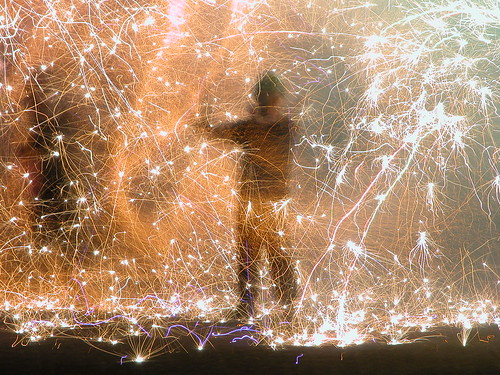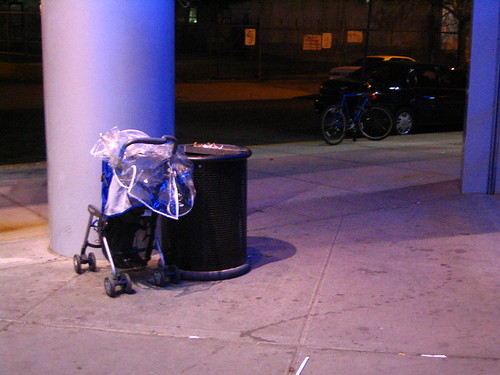
I carry around a bottle of Social Convention Dissolving Spray®. It’s useful stuff. When I come up against a social convention I don’t want to deal with I hit it with a few spritzes of the spray. Then I can say and do whatever I want.
You can make it yourself if you have the ingredients. You take one part resistance to awkwardness, two parts lust for attention, and one part ignorance to potential consequences, and dissolve them to 12% in an aqueous solution. Let it age for a week or two, and bam. Your own Social Convention Dissolving Spray®.
My friends think I do this naturally. I don’t, although it strokes my ego—and therefore makes my supply of lust-for-attention more potent—that they think that. But I don’t just do it. When I want to experience the power and freedom that comes from making a deliberate ass out of myself in public I have to open up my skull, reach into my brain, and pull out the spray.
Some people do it as naturally as they breathe. Some people produce the spray in their sweat glands. Like pheremones. It weird and crazy when you see it in the wild. But I saw it today.
Mamacat—my elderly mobility and internal-monologue challenged mother-in-law—offered to take me out to breakfast this morning. I agreed because I like free breakfast, even though outings with Mamacat are trying. Getting out of the house with Mamacat is like pulling teeth from your breakfast cereal. Strictly speaking it’s easy, but by the time you are done you’re not sure you still want to eat the cereal.
We went to a local diner that I quite like. It’s full of jars of jam on window sills and the kind of totem polls that would somehow fit in at a Denny’s. The host sat us down, and a moment later he sat another mother-and-son duo in the booth across from ours. The mother was younger than Mamacat, and the son older than me. This isn’t unusual given that Mamacat has 40 years on me. Plus she’s British. That ages you.
The mother wore a wool scarf and a knit hat. The son looked like he could play Jerry Seinfeld in a low-budget Lifetime movie about the drama behind the comedy. A few minutes after they opened their menus Jerry stopped an old man who was walking by and engaged him in a five minute conversation about whether or not he was from New York. I don’t know if they knew each other.
About ten minutes into the meal Mamacat finally finished her salad and got ready to eat her turkey burger. Her fingers were covered in honey mustard, and she fished around on and around the table for her napkin. It was nowhere to be found. Meanwhile I also needed a napkin, because I forgot to take my alergy meds today and my first napkin subbed in for tissue duty.
“I should have asked for more napkins when I had the chance,” I said to Mamacat. Mamacat hmmed in agreement.
There was movement next to me, and I turned to see that Wool Scarf Lady had leaned over and was handing me her napkin. A second later son Jerry did the same.
“Thank you!” I said, laughing as I took the napkins. As soon as I took the first one, Wool Scarf reached over and grabbed another one to hand me.
“You bet,” she said.
I almost made a comment about how sometimes evesdropping can be helpful, but I held my tongue. You never know how someone will take something like that. Fifteen seconds later the server showed up with yet another pile of fresh new napkins. Apparently I said my request in a loud tone.
“Wow,” I said to Mamacat, “it’s amazing how well that worked. I wonder if it would work for other things.”
“Could be,” said Mamacat.”
“Gee!” I said so everyone around could hear, “I sure wish we could afford this meal! I could really use a pile of cash right about now!”
Wool Scarf and her faux-Emmy-winning son laughed.
“Yeah,” I said, “maybe that was asking for too much.”
“Well,” said Wool Scarf, still laughing, “you’re no Jerry Seinfeld.”
I didn’t know what to make of that. Did that happen in a Seinfeld episode, or was she just criticizing my attempts at comedy? Maybe she’d been trying for years to tell her son that he looked like Seinfeld, but didn’t want to come out and say it. I wanted to respond, “I made you laugh, didn’t I?” But I didn’t. Because I’m not a psycho. I went back to my meal.
After we finished eating Mamacat paid the bill and I told her I was going to the bathroom. I went inside and sat down. A minute later someone else walked into the bathroom. I sneezed and blew my nose for the five thousandth time today.
“Is that you, sneezy?” said a voice from the other side of the stall. It was Jerry Not-Quite-Seinfeld.
I didn’t say what I wanted to, which was, “Um…can you not talk to me while I’m sitting on the toilet? That’s violating social convention and it makes me uncomfortable.”
Instead I hit myself with a little Social Convention Dissolving Spray®, and answered the question. “Yep.”
“What you got there? A cold?”
“Allergies.”
“In winter?” he said, in a tone that implied that I was lying. Because of the obvious advantage that would give me.
“I have alergies all year,” I said. “Indoor and out door.”
“Well isn’t that something?”
“Yep,” I said. By this time I was out of the stall and washing my hands, and he was using the urinal. But he never stopped talking. We continued to make small talk.
As I left the room he said, “Merry Christmas,” in a tone that sounded like it might be testing to see if I might screw up and say “Happy Holidays.” Or perhaps “There is no God but Allah and Muhammed is his prophet.” I said Merry Christmas back, and left.
I got to the table and helped Mamacat up and prepared to leave.
“Bye,” said Wool Scarf.
“Bye,” I said, grinning. “And thanks again.”
“You got it,” she said. “What you got there? A cold?”
“Allergies,” I said.
“What are you allergic to?”
I laughed. “Everything.”
“That must be hard on your marriage,” she said.
I shrugged. “It’s worked out the last 10 years.”
“Are you allergic to your wife?” she asked. I couldn’t help the feeling that our friendly banter had morphed into an Epee match, and she was determined to score a point by hitting me in the toe.
“No,” I said.
“Well, then, you’re not allergic to everything, are you?”
“It’s a paradox,” I said, instead of dropping it like a sane person. I think I still had some spray on me. “Think about it all day. Some time around midnight it’ll hit you, and you’ll wake up and say ‘aha!’”
She smiled and narrowed her eyes. “You’re a man of mystery.”
I didn’t know what to say, so I laughed.
It took Mamacat long enough to get her things together that by the time we got to the front door of the restaurant the Seinfelds were already there. They were chatting with the old man who may or may not have been from New York and his wife. All of them greeted Mamacat and I like old friends who haven’t seen each other in years because they never got along that well in the first place.
We all left together. I ended up holding the door for the entire party. As Jerry disappeared into his car half way across the lot, he pointed at me with one finger and gave me a wink.
Using Social Convention Dissolving Spray® sometimes has awkward consequences. But the nice thing about it is that you can use it only when you want to. The rest of the time you get to leave it in your brain and be a more or less normal person. Plus, it wears off.
Unlike pheremones.


